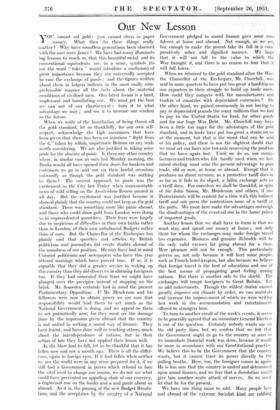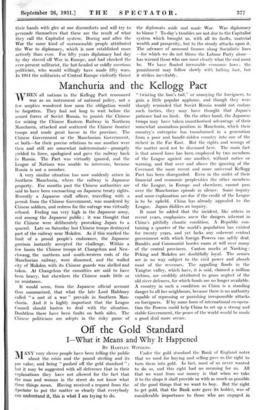Our New Lesson
YOU cannot eat gold : you cannot dress in paper money. What then do these things really matter ? Why have countless generations been obsessed with the auri sacra fames ? We have had many illuminat- ing lessons to teach us that this beautiful metal and its conventional equivalents are, in a sense, symbols (to use the word " token " would introduce a confusion) of great importance because they are universally accepted to ease the exchange of goods ; and the figures written about them in ledgers indicate in the most easily com- prehensible manner all the facts about the material conditions of civilized men. Our latest lesson is a hard, unpleasant and humiliating one. We must get the best we can out of our chastisement ; turn it to what advantage we may ; and use it to increase our wisdom in the future.
When we write of the humiliation of being thrust off the gold standard, let us thankfully, for our own self- respect, acknowledge the high assurances that have been given that there has been no injurious "flight from the .E," taken by selfish, unpatriotic Britons on any scale worth considering. We are also justified in taking some pride for the absence of panic. Is there any other country where, in similar case as ours last Monday morning, the Banks would all have opened their doors for bankers and customers to go in and out on their lawful occasions outwardly as though the gold standard was nothing to them ? The nearest approach to panic was the excitement in the City last Friday when unaccountable news of wild selling on the Amsterdam Bourse poured in all day. But the excitement was justified because it showed plainly that the country could not keep on the gold standard. There was something more like panic abroad, and those who could draw gold from London were doing so in unprecedented quantities. Their fears were largely due to suspicions of difficulties in their own banks rather than in London, of their own unbalanced Budgets rather than of ours. But the Chancellor of the Exchequer has plainly said that speeches and articles by British politicians and journalists did create doubts abroad of the soundness of our position. He may have had in mind Unionist politicians and newspapers who have this year uttered warnings which have proved true. If so, it is arguable that they did a greater service in waking up this country than they did disservice in alarming foreigners too. If they had concealed their fears we might have plunged over the precipice instead of stopping on the brink. Mr. Snowden certainly had in mind the present Parliamentary Opposition. If Mr. Henderson and his followers were now to obtain power we are sure that responsibility would lead them to act much as the National Government is doing, and we appeal to them to act patriotically now, for they must see the damage done by the impression given abroad that the country is not united in seeking a sound way of finance. They have learnt, and have done well in teaching others, much about the interdependence of nations, but in their action of late they have not applied their lesson well. - As the blow had to fall, let us be thankful that it has fallen now and not a month ago. There is all the differ- ence, again in foreign eyes. If it had fallen when neither we nor the world were in any sense prepared for it, if we still had a Government in power which refused to face the vital need to change our course, we do not see what could have prevented an appalling elude of our currency, a frightened run on the banks and a real panic about us abroad. As it is, the passing of the new Budget Resolu- tions and the acceptance by the country of a National Government pledged to sound finance gave some con- fidence at home and abroad. Not enough, as we see, but enough to make the pound take its fall in a com- paratively sober and dignified manner. We hope that it will not fall to the value to which the War brought it, and there is no reason to fear that it will fall lower.
• When we returned to the gold standard after the War, the Chancellor of the Exchequer, Mr. Churchill, was said in some quarters to -have put too great a hardship on our exporters in their struggle to build up trade anew. How 'could they compete with the manufacturers and traders of countries with depreciated currencies ? On the other hand, we gained enormously in not having to pay in depreciated pounds the many millions that we had to pay to the United States for food, for other goods and for our huge War Debt. Mr. Churchill may have been a little too eager for the advantages of the gold standard, and in haste have put too great a strain on us at the moment, but that is the worst that can be said of his policy, and there is not the slightest doubt that we must set our faces now towards recovering the position that we have again lost. Until we do so, our manu- facturers and traders who felt hardly used when we last raised sterling must seize the present advantage to gain trade, old or new, at home or abroad. Except that it produces no direct revenue, as a protective tariff does in so far as it fails in its object, a fallen exchange acts as a tariff does. - For ourselves we shall be thankful, in spite of Sir John Simon, Mr. Henderson and others, if our Protectionists will be content for a time with this indirect tariff and not press the contentious issue of a tariff at the ports. We must here make the advantages outweigh the disadvantages of the eventual rise in the home prices of imported goods.
Another lesson that we shall have to learn is that we must stay and spend our money at home ; not only those for whom the exchanges may make foreign travel too expensive. Business and genuine ill-health will be the only valid excuses for going abroad for a time. Mere pleasure will not be enough. This particularly grieves us, not only because it will hurt some people, such as French hotel-keepers, but also because we believe that foreign travel is the best of educations and one of the best means of propagating good feeling among nations. But there is another side to the shield. The exchanges will tempt foreigners to Great Britain. Let us add inducements. Though the wildest etatiste cannot greatly improVe our climate by order, we can maintain and increase the improvement of which we were writing last week in the accommodation and entertainment offered to strangers here: To turn to another result of the week's events, it seems to be generally agreed that an immediate General Election is out of the question. Certainly nobody wants one on the old party lines, but we confess that we felt that the Government ought to go to the country so soon as its immediate financial work was done, because it would be more in accordance with our Constitutional practice. We believe this to be the Government that the country wants, but it cannot trace its power directly to the polling booths. Here, too, the foreigner comes in again. He is less, sure that the country is united and determined upon sound finance, and we fear that a dissolution would give him another acute attack of nerves. So we must let that be for the present.
We_ have one thing more to. add. Many people here and abroad of. the , extreme Socialist kind are rubbing



































 Previous page
Previous page